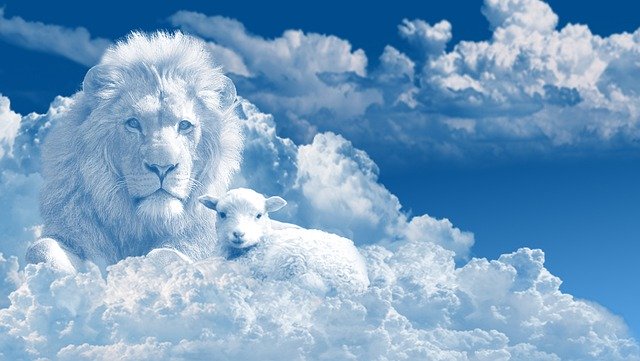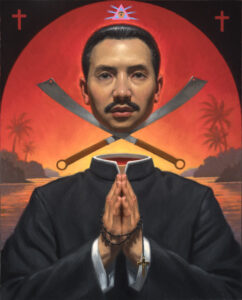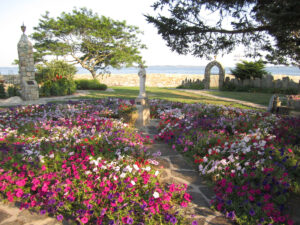The Agnus Dei of Jacques Marquette
Before the thousands, Père Marquette stood up to preach,
That through the Blessed Virgin none escape his reach;
That though he suffer all, he’d bear the sacred story
Down the great river he’d entitled to her glory.
And now, before him, knelt the warriors and their chiefs
To whom, a year ago, he’d promised her reliefs
From sin and solitude, from shadowed ignorance,
And, in that wounded wilderness, her peace advance.
Behind him, four great images of her were raised
On Chinese taffeta that left the fires amazed;
They heard of Jesus Christ, who on that day had died
For them upon the cross, his mother there beside,
And John, who loved and honored her with filial love.
The mysteries of the faith seemed hovering just above.
But even as he spoke and offered all as gift,
Marquette felt deep within his side the aching rift
That would, a few days hence, force him to leave again
This mission he had credited the virgin’s gain.
And leaving thus, he knew already, he would meet
Her robed and crowned with stars, and treading with bare feet.
Those feet, he told them now, would trample Satan’s head,
Restoring life and light to this world dark and dead.
For years, he’d served the mission of the northern lake,
Learned the Algonquin tongues and said Mass for the sake
Of those who had been baptized by priests come before him.
But it was not for this so many waters bore him
To that new world, where Jogue and Jean Brébeuf had died;
And not for this that in his private prayers he cried,
Begging Our Lady send him where all were deprived
Of knowledge of her son. Then, Joliet arrived.
“This day of the Immaculate Conception, he
Comes bearing news we are to solve the mystery
Of the Great Water our Illini say runs west
Beyond those lands claimed by a French or Spanish crest,”
Marquette wrote, but by then the lakeshore sank in ice;
Marquette wrote, but by then the lakeshore sank in ice;
They waited, stomachs hungry, fur coats plagued with lice.
He waited, making the Ignatian long retreat,
His prayer, cold breath, and penance, his cold ache of feet.
They waited, till the sun returned with biting flies,
Then seven men, with corn and smoked meats for supplies,
Launched birch canoes, at last, that they might go explore
What other miracles Our Lady had in store.
How beautiful, descending the Meskousing stream,
To slip along soft waters, marshy with the cream
Of wild rice. As they passed, the birds rose in a cloud
And flapped one great arc through the sky until it bowed
Back to the water and hid once again in reeds,
Whose stalks brushed the canoe and filled its floor with seeds.
Marquette knew it a place through which a man may pass
As unremembered guest, as breath upon cold glass,
And spoke into that emptiness a further vow:
To dedicate to Mary all that she’d allow.
As deer roused from their drink upon the iron shore,
Then fled beneath the towering oaks, he heard the roar,
Dim at first, loudening, as the idle current sped
And spat them forth upon the Mississippi’s bed.
“I felt,” Marquette would write, “a joy I can’t express,
To name for her that river which flows like a tress
Down the vast, rolling back of that great land we bring
To Christ, and trust to the protection of our king.”
The river was so wide and gentle, deep and brown,
They drew their oars in, let its silence take them down.
But then, a giant fish struck, shaking the canoe,
And in the grass, a great wildcat came into view,
Straight-whiskered, tiger-faced, with pelt of gray and black;
A bone-nosed sturgeon leaped and splashed upon its back.
But, more than these, and stranger, prairies to the West
Seemed shadowed with dark masses: horned, in shaggy vest,
Broad-headed and thick-maned, hump-shouldered buffalo
Whose skin and meat they had already come to know,
But whose horns they had yet to see impale a man
Then hoof him in the dust, within a moment’s span.
“For days, I saw such creatures, but no human being.
We kept our fires small, for fear of what they’d bring,
And bedded through the dark hours in our anchored boats
Where I stared up at stars and murmured over my notes,
Knowing that all we carried with us could be lost
And that I’d pay with pleasure a still greater cost,
So long as I may bring to such a wild part
The mysteries Our Lady pondered in her heart.”
But then, Marquette would write, one afternoon they found
Faint tracks imprinted in the shoreline’s muddy ground.
Marquette and Joliet alone pursued the trail
And, silent, came unseen within a village pale.
Then, loud they raised their voices, and the priest stood tall
In long black robe, as braves came answering their call.
The Indians wore French cloth and bore a calumet
Dangled with greeny feathers, as they came and met
The strangers. They were called the Illinois, one said.
An old man spoke: “How beautiful the sun that’s led
You Frenchmen to us, and we welcome you in peace.”
Then women crowded, children stared up without cease.
As all these gathered, the young priest stood forth to speak:
“O people, you like us the Father made, and weak
Like us, you are the children of his sacred pity;
He wishes you to join him in his holy city,
And so he’s sent me down this river as his priest,
That all who live upon it may share in his feast.
Let crosses be upraised and idols downward hurled
That all shall see his peace restored into the world.”
Their chief replied, “The sun grows bright, the river smooth,
The corn more sweet, tobacco in its power to soothe,
Because you come among us. But, I beg of you,
Proceed no farther or a beast downstream will chew
Your boats to splinters, and the Arkansas are fierce,
Return all greeting with a wail, and gladly pierce
The stranger with their arrows and their Spanish guns.
There is no further good where this great water runs.”
But when he paused, the priest replied that he’d no fear
To lose that life God gave him, not to be held dear,
Then promised to those people he would come again
To live with them, if that was what the Lord should deign.
And though the harsh Missouri caught them in its flood,
Great demons stalked the cliffs, and Indians cried for blood;
Though even Marquette would feel an axe blade graze his head,
And fever and mosquitos weakened his soft tread;
Within a year, though pale and worn, he did return.
And there, he preaches, till his guts begin to burn
And names one last place after the Immaculate,
For even now, he knows the hour has grown late.
He takes his leave again to trace the northern shore,
Where, in the Easter twilight, he can row no more.
His two companions urge him on with words and tears;
But he has prayed for this, and silences their fears:
“My brother Xavier died in wretchedness afar,
And brothers Issac, Jean, and Gabriel died in war.”
They lay him by the water, build a hut of bark,
And see his eyes are brightening as the sky grows dark.
“Mother of God, remember me,” they hear him call;
And then, Marquette lay back his head, and that was all.




